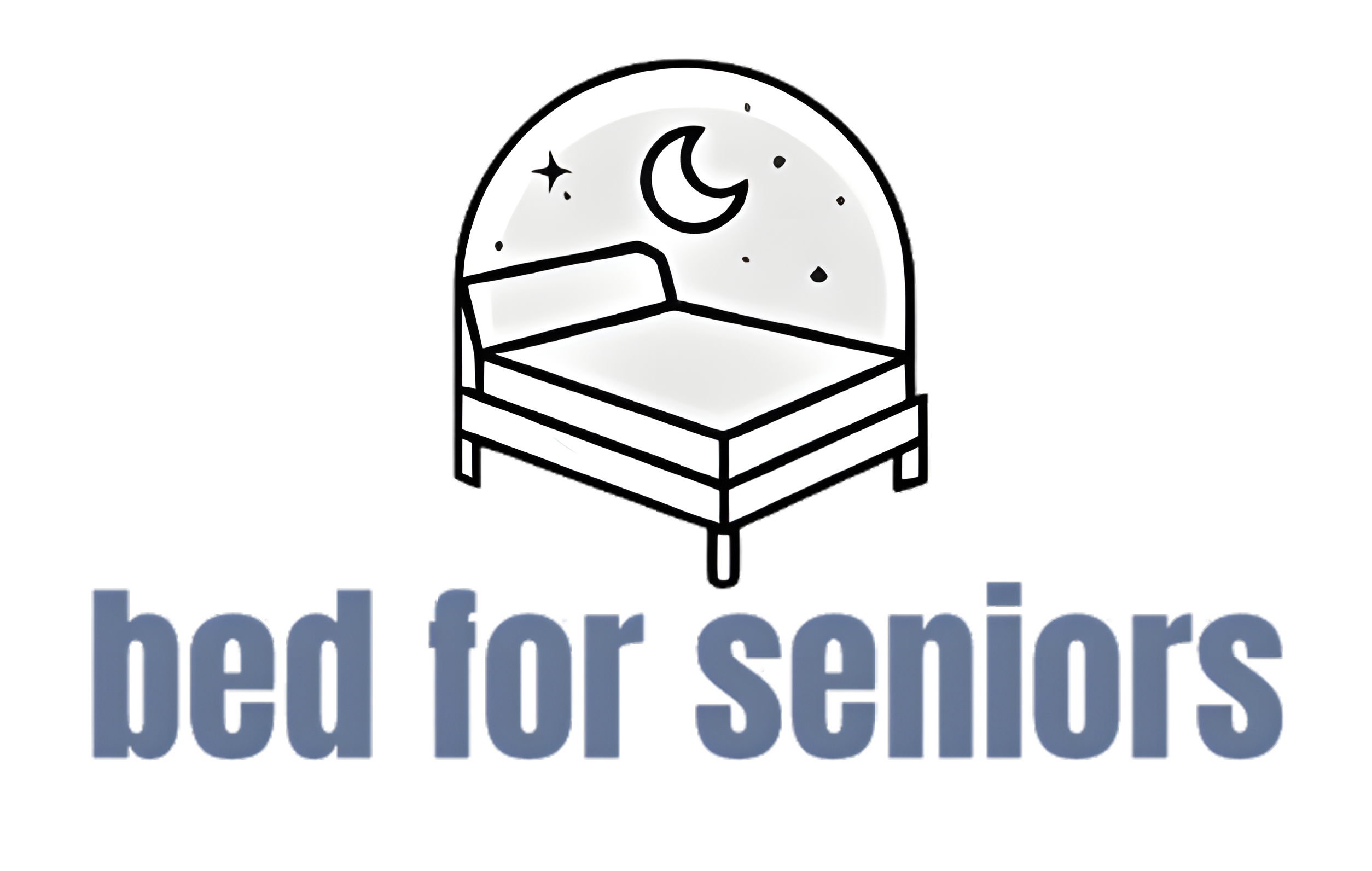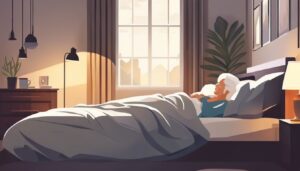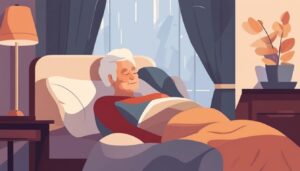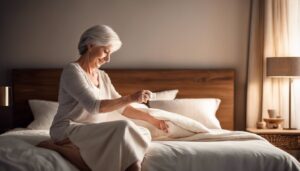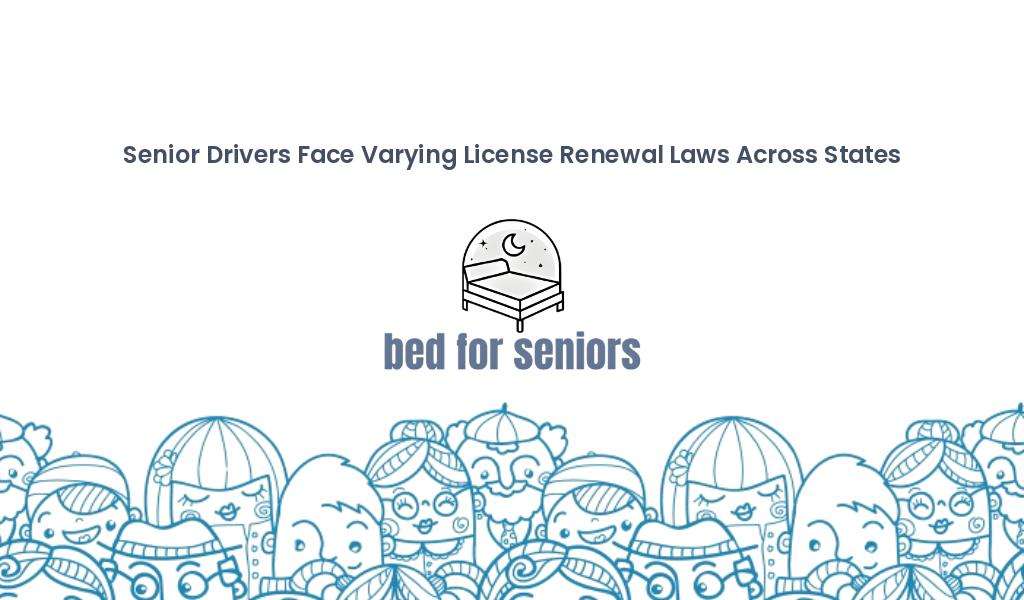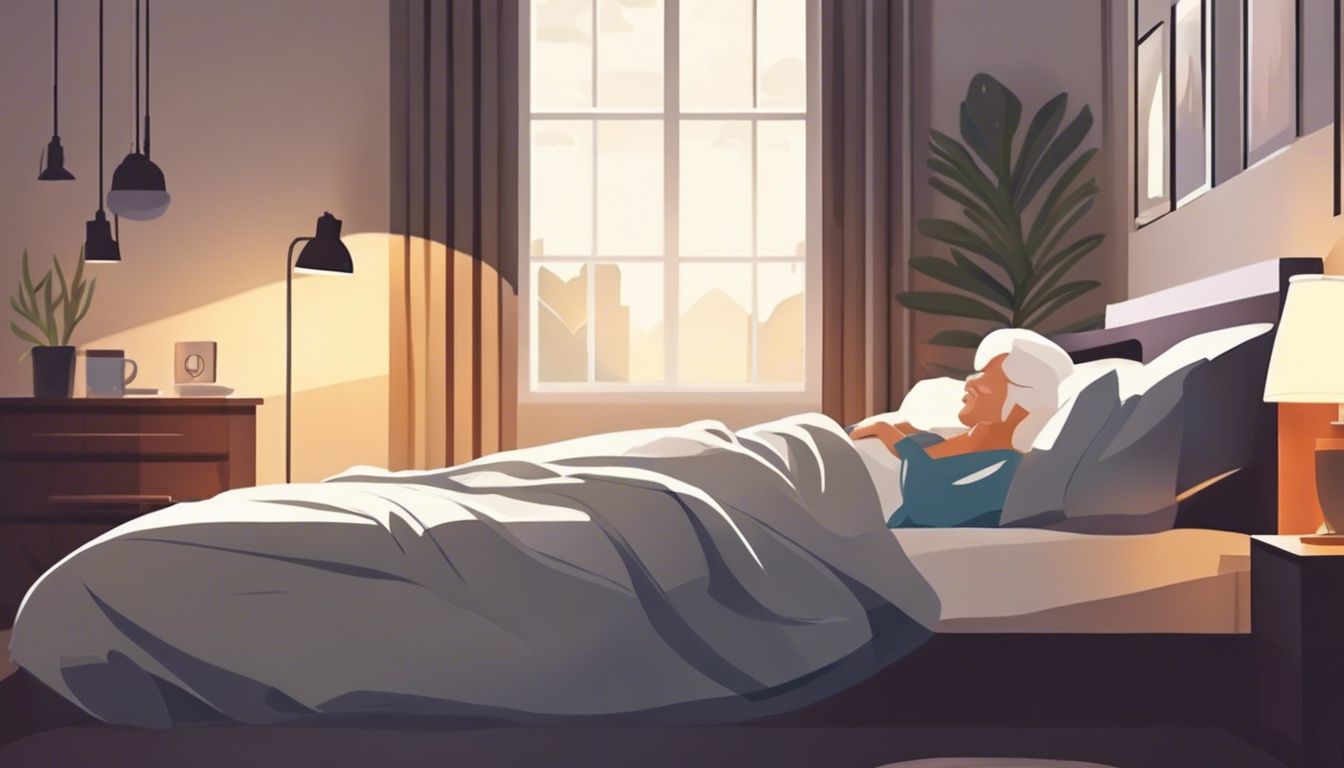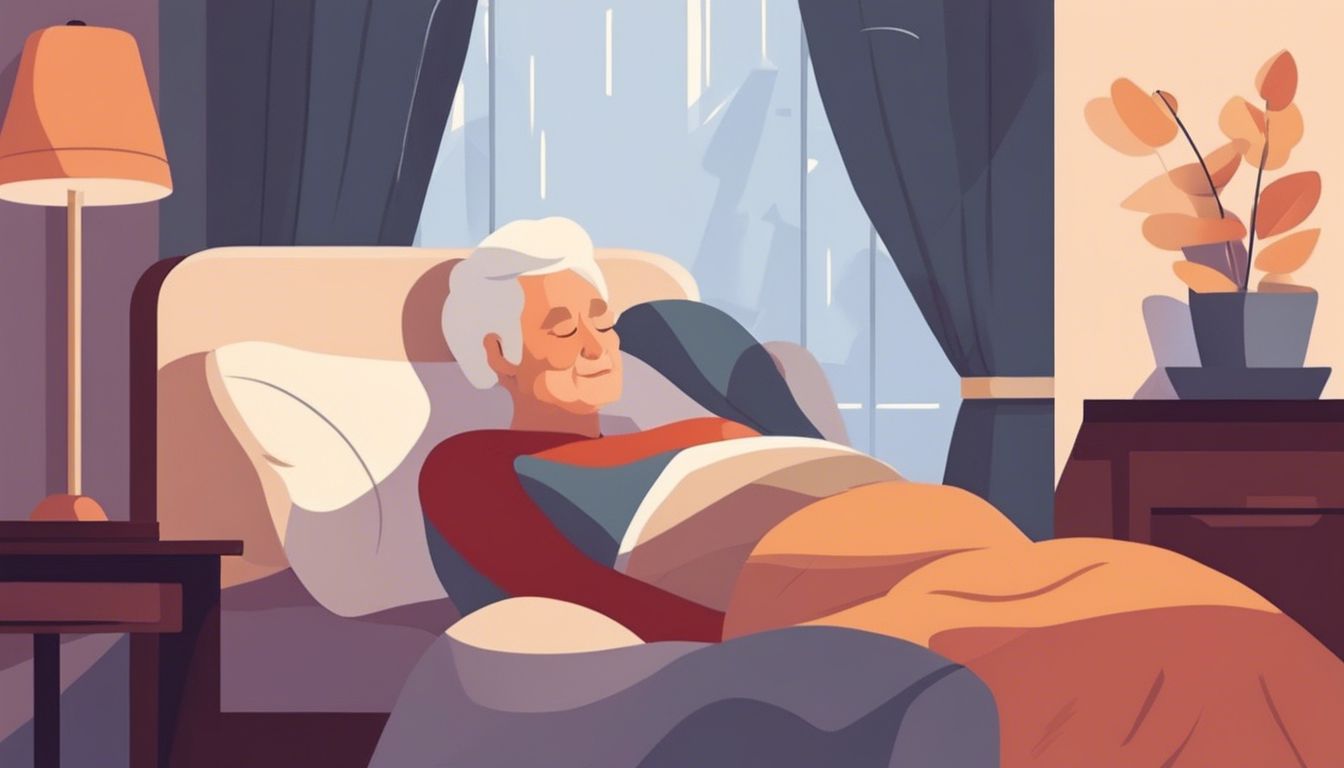Many older adults have trouble sleeping. A fact: sleep quality drops as people get older. This article shows ways to improve night rest for seniors. Read on for tips.
Key Takeaways
- Seniors need 7 to 9 hours of sleep but may have trouble due to changes in their bodies. Common issues include less deep sleep and more waking up at night.
- Making a steady bedtime routine, keeping the sleeping area dark and quiet, and avoiding caffeine before bed can help improve sleep quality.
- Checking medications with doctors, reducing stress through relaxation techniques, and managing diet and exercise are important for better rest.
- Cool bedrooms between 60 and 70 degrees Fahrenheit support better sleep. Also, turning off screens an hour before bed helps avoid disrupted sleep cycles.
- Regular physical activity during the day improves nighttime rest. But it’s best not too close to bedtime as it might make falling asleep harder.
Understanding Sleep Challenges in Seniors
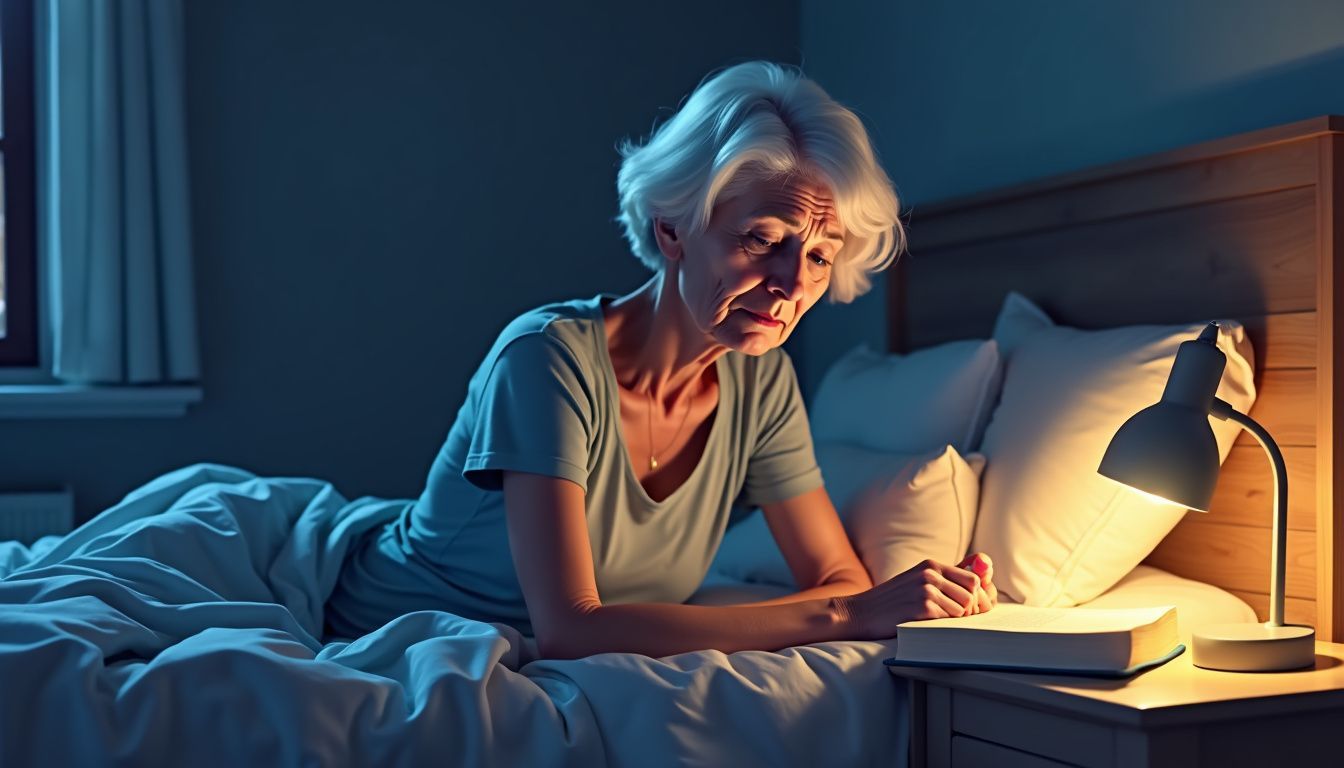
As seniors age, their sleep patterns change. This can lead to less deep sleep and more wake-ups during the night.
Age-related changes in sleep patterns
As people get older, their sleep changes. They might not sleep as deeply and wake up more during the night. Aging causes less growth hormone and melatonin production. This leads to fragmented sleep.
Older adults still need 7 to 9 hours of sleep each night.
These changes can make it hard for them to stay asleep or fall back asleep if they wake up at night. Less deep sleep means they might feel tired even after a full night’s rest. Next, we’ll look into common sleep disorders in older adults that add to these challenges.
Common sleep disorders in older adults
Older adults often encounter sleep difficulties. Insomnia is a significant problem that can stem from stress, depression, anxiety, health issues, and certain medications. Another issue is Restless Legs Syndrome (RLS), which causes a feeling of discomfort in the legs when at rest, impacting sleep.
Periodic Limb Movement Disorder (PLMD) leads to sudden arm or leg jerks during sleep. Sleep apnea, a common but serious issue, causes breathing to pause momentarily throughout the night, which can result in a stroke and high blood pressure.
Alzheimer’s disease also impacts sleep patterns. It disrupts the sleep-wake cycle, leading to difficulties in staying asleep at night and remaining awake during the day. These disorders can make individuals feel fatigued and may have detrimental effects on their health over time.
Why Do Elderly People Have Trouble Sleeping?
Elderly people often face sleep problems because their bodies change over time. Aging can make the production of growth hormone and melatonin go down. These changes affect how well they can fall and stay asleep.
Many seniors have trouble sleeping through the night without waking up.
Sleep disorders like sleep apnea are more common in older adults too. This condition can stop them from breathing right as they sleep, leading to poor rest and health issues such as stroke and high blood pressure.
Because of these factors, finding deep, refreshing sleep becomes harder with age.
Practical Strategies to Enhance Sleep Quality
To get better sleep, keeping a steady bedtime routine helps. Making your sleeping area quiet and dark also plays a big role.
Establishing a consistent sleep schedule
Older adults need 7 to 9 hours of sleep every night. A consistent sleep schedule helps a lot.
- Pick a bedtime and wake-up time that works for your senior. Keep these times the same every day, even on weekends.
- Create a bedtime routine. This can include reading, listening to calming music, or taking a warm bath.
- Make the bedroom only for sleep. Remove TVs, computers, and other distractions.
- Use light wisely. Keep the bedroom dark at night and let in natural light in the morning.
- Avoid heavy meals, caffeine, and alcohol before bed. These can disturb sleep.
- Encourage physical activity during the day but not too close to bedtime.
- If naps are needed, make them short and not late in the day.
- Write down worries or plans for the next day an hour before bed to clear the mind.
Encourage your senior to try these steps for better nights ahead. Now let’s look into optimizing the sleep environment…
Optimizing the sleep environment
Creating a good sleep environment is key for better rest. This is especially true for seniors facing sleep challenges due to aging.
- Keep the room cool, between 60 and 70 degrees Fahrenheit. A cooler room helps the body rest.
- Turn off screens an hour before bed. This reduces blue light exposure, which can disturb sleep cycles.
- Use soft earplugs or a white noise machine to block out sound. Quiet helps seniors fall asleep faster and stay asleep.
- Invest in a comfortable mattress and pillows that support the body well. Good support reduces pain from conditions like arthritis.
- Make sure the room is dark enough. Use blackout curtains or a sleep mask to block out light.
- Avoid caffeine and heavy meals close to bedtime. These can keep seniors awake and disrupt their sleep cycle.
- Get some sunlight during the day. Natural light helps keep the internal clock set right, improving sleep at night.
- Encourage physical activity during the day but avoid strenuous exercise close to bedtime as it can make falling asleep harder.
Each of these steps helps create an environment that supports deep, restful sleep for older adults dealing with insomnia, nighttime urination, or other sleep disturbances common in later life.
Managing diet and exercise for better sleep
After we create a good sleep environment, looking at diet and exercise helps even more. These steps make sleep better.
- Eat light meals before bed. Heavy food causes heartburn and makes it hard to sleep.
- Avoid caffeine after 2 PM. Drinks like coffee keep you awake.
- Exercise regularly but not right before bed. Walk or swim to improve sleep but finish a few hours before sleeping.
- Drink less water in the evening. This reduces bathroom trips at night.
- Include foods with magnesium and potassium in dinner, such as bananas and almonds, to help relax muscles.
- Practice relaxation techniques after dinner, like meditation or deep breathing, for stress relief.
- Set a goal of 30 minutes of aerobic exercise daily; it boosts mood and tire you out in a good way.
- Limit naps to early afternoon, for no longer than 20 minutes, to avoid trouble falling asleep at night.
- Choose snacks wisely if hungry before bed—opt for dairy or whole grains that promote sleep.
- Consult healthcare providers about the effects of any medication on sleep patterns; some can disturb rest.
Following these tips will lead to better nights’ rest, which is crucial for health as we age.
Addressing Psychological and Medical Factors
Talking to healthcare providers and trying stress-reduction methods can help seniors sleep better… Keep reading for more helpful tips.
Reviewing medications with healthcare providers
Medications can cause sleep problems in seniors. It’s key to check these with doctors for better sleep.
- List all medicines. Include prescription drugs, over-the-counter pills, and even supplements.
- Highlight medications linked to insomnia or sleeplessness, such as some blood pressure drugs or antidepressants.
- Discuss the timing of medicine intake. Some may interfere with sleep if taken too late in the day.
- Ask about alternatives that won’t affect sleep. There might be different drugs without sleep-disrupting side effects.
- Check for interactions between medicines that could worsen sleep issues.
- Consider dose adjustments with your doctor’s advice. Lower doses might reduce side effects on sleep.
- Explore non-drug treatments for conditions like chronic anxiety or depression that affect sleep but could be managed with cognitive-behavioral therapy (CBT).
- Regularly update healthcare providers on any new symptoms of poor sleep or tiredness during the day.
- Keep a diary of sleeping patterns and how they change with medication adjustments.
- Stay informed about new research or treatments that might improve both health and sleep quality without relying heavily on sleeping pills.
Techniques for stress reduction and relaxation
Stress, depression, and anxiety often cause sleep issues in older adults. Techniques to reduce stress and relax can lead to better sleep.
- Set a calm bedtime routine. This might include reading or listening to soft music.
- Try deep breathing exercises. These help calm the mind and body before bed.
- Use guided imagery or meditation apps. They aid relaxation and turn off racing thoughts.
- Keep a worry journal. Write down concerns earlier in the day so they’re not on your mind at bedtime.
- Practice gentle yoga or stretching exercises to ease tension.
- Spend time with friends or loved ones to combat social isolation that can cause stress.
- Limit caffeine and sugar intake, especially in the evening, to avoid feeling too awake.
- Make sure the bedroom is quiet, dark, and cool for optimal sleeping conditions.
- Consider psychotherapy or cognitive behavioral therapy if stress from health problems like heart disease or diabetes is making sleep hard.
- Look into relaxation techniques like muscle relaxation which helps prepare your body for sleep by reducing physical tension.
Each step addresses common causes of insomnia by focusing on mental health and creating a supportive environment for sleep.
Conclusion
Seniors can sleep better by following simple steps. Keep a regular bed and wake-up time to help the body’s natural clock. Make the bedroom quiet, dark, and cool for sleeping well. Cutting down on naps during the day also helps stay tired at night.
Eating light meals and not drinking caffeine late in the day make falling asleep easier. Finally, talk with doctors about sleep troubles to find out if health issues or medicines affect sleep.
These actions improve seniors’ sleep quality step by step.
FAQs
1. What is the connection between sleep deprivation and Alzheimer’s disease?
Sleep deprivation can increase the risk of Alzheimer’s disease in seniors, as lack of sleep disrupts normal brain function.
2. How can a regular sleep-wake schedule improve sleep quality for older adults?
A consistent sleep-wake schedule helps regulate circadian rhythms, reducing daytime sleepiness and improving overall physical health.
3. Can cognitive behavioral therapy (CBT) help seniors who struggle with chronic insomnia?
Yes, CBT administered by a cognitive behavioral therapist can provide effective strategies to combat chronic insomnia without relying on sleep medication.
4. Are there any tips from the National Sleep Foundation that could help seniors improve their sleeping habits?
The National Sleep Foundation recommends maintaining good sleep hygiene, avoiding caffeinated drinks before bedtime, and treating medical conditions like obstructive sleep apnea or acid reflux which may cause disrupted rest.
5. How does aging affect our stages of sleep and what are the impacts on our health?
With aging comes changes in our “sleep architecture,” including less time spent in slow-wave REM cycles. This inadequate rest contributes to feeling tired upon waking up – it may also lead to weight problems or cardiovascular diseases over time.
6. Is it possible for seniors to get too much rest?
Indeed! Oversleeping might indicate an underlying issue such as dementia or REM Sleep Behavior Disorder – both require medical attention if suspected.
